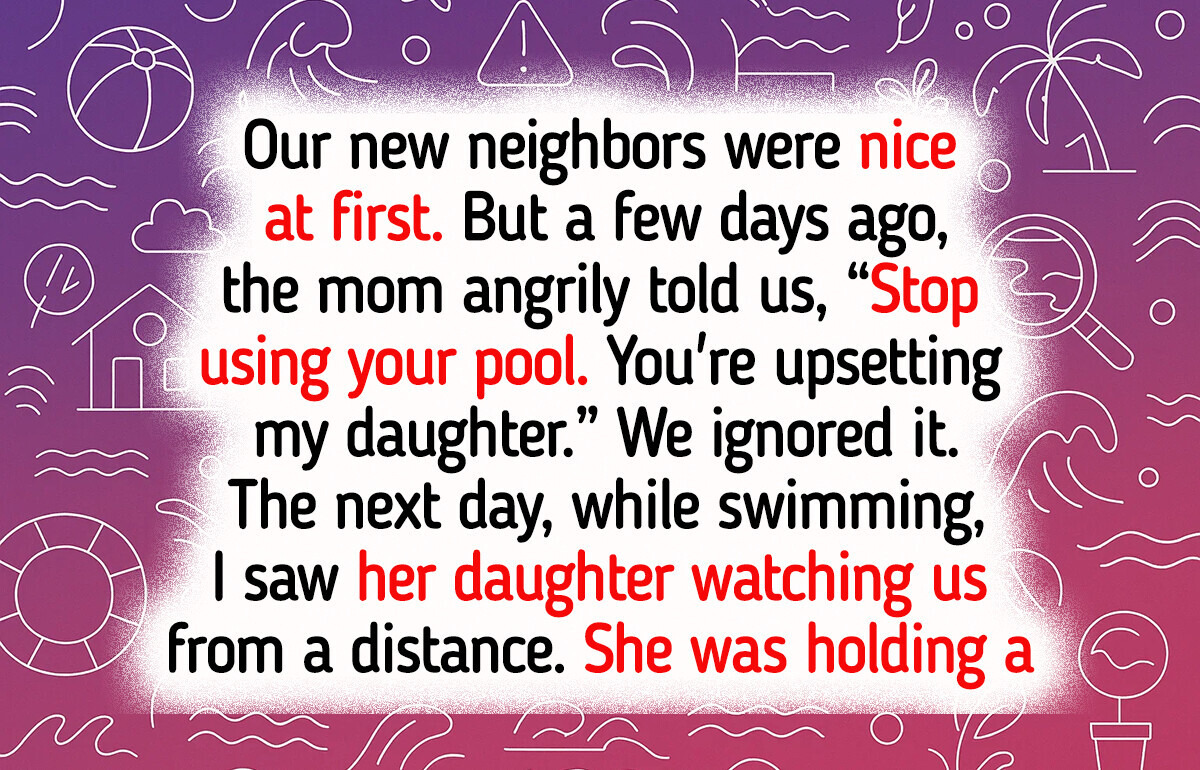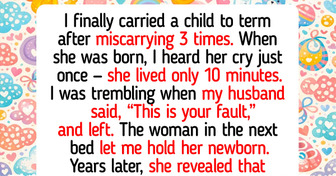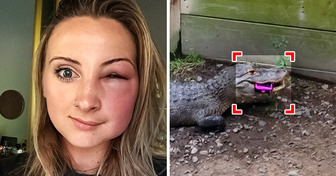18 Stars Who Openly Talked About Plastic Surgery


Getting along with your neighbors is all about balance and mutual respect. When everyone understands each other, it can lead to lasting friendships — but when they don’t, things can quickly turn sour. One of our readers found this out the hard way after her neighbor took issue with the fun she was having in her pool.
Hi Now I’ve Seen Everything!
Our new neighbors were nice at first. They came by to introduce themselves and their 8-year-old daughter, even bringing over a plate of homemade treats. But their friendliness didn’t last long once we started using our pool again.
A few days ago, the mother showed up at our door, visibly upset, and snapped, “You need to stop using your pool — you’re upsetting my daughter.” Her demand completely caught me off guard. I was shocked by her request and after discussing it, my husband and I decided to ignore her. It’s our home, and we have every right to use our pool whenever we please.
But yesterday, while we were swimming, I noticed their daughter standing a little way off, watching us quietly. After a moment, she started waving to get my attention. That’s when I saw she was holding something in her hands. She pointed at it with a sad expression, so I gently motioned for her to come closer.
She happily did so and sat at the edge of the pool with her feet in the water. Then she told me something that broke my heart. Two years before they moved in next to us, they had a pool. Her little brother fell in, and unfortunately, he didn’t make it. She was holding a picture of him.
She told me she had never learned to swim, and ever since the accident, her mother hasn’t allowed her anywhere near a pool. Before we could say much more, her mom suddenly came outside and saw her sitting there with her feet in the water. The look on her face said it all — she was absolutely furious.
She told her daughter to get into the house and turned her attention to us. But before she could start arguing, I said, “I’m a preschool swim instructor. I could teach your daughter everything she needs to know to be safe in and near pools.”
The mother went pale as a sheet and left. We haven’t seen or heard from her or her daughter since. I feel bad for the kid. She obviously likes water and wants to learn how to swim. But her mother’s fears are holding her back.
So now I’m torn. Should I reach out to her mother again, maybe explain the situation and tell her about my background and experience — hoping it might ease her worries? Or would it be better to just leave them alone and give them space to heal in their own time?
Regards,
Helen T.
Thank you for sharing your story with us, Helen. We understand how challenging this situation must feel, especially since you’re unsure how to handle things moving forward. To help you navigate it, we’ve put together a few suggestions that might make this a little easier.
Instead of offering formal lessons right away, start with small, low-pressure steps. You might suggest that the girl simply watch you teach another child or sit nearby while you demonstrate basic pool safety. You could even invite her mother to observe from a distance. This way, the focus shifts from “swimming lessons” to “healing and safety,” which may feel much less intimidating for both of them.
Instead of approaching the mother with your qualifications right away, try opening the conversation from an emotional place. For example, you could say something like, “I can only imagine how scary that must have been for you. I’m so sorry for what your family went through.” People who’ve experienced trauma around water often respond better to compassion before logic. Once she feels understood, you might gently mention that your goal isn’t to push swimming. It’s to help her daughter feel safe around water again, at her own pace.
You did the right thing by responding with kindness and understanding. Now, the best thing you can do is give her some space. Trauma takes time to heal, and people often begin to relax when they see consistent, gentle behavior from those around them. Continue being a calm and friendly neighbor — and if the mother ever reaches out, even in a small way, you’ll already have laid the foundation of trust she needs to feel safe again.
A Reddit user recently shared a story that started with a simple act of kindness but quickly spiraled into unexpected drama. When she helped her new neighbor carry a few boxes into their building, it seemed like nothing more than a friendly gesture. Everything felt completely ordinary — until her husband came home.











